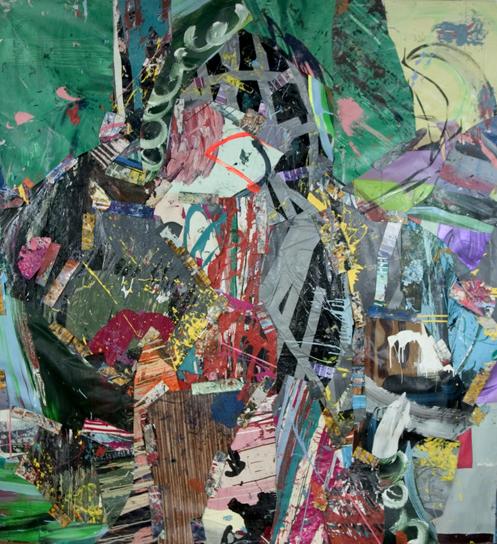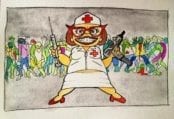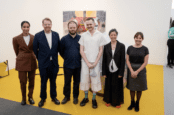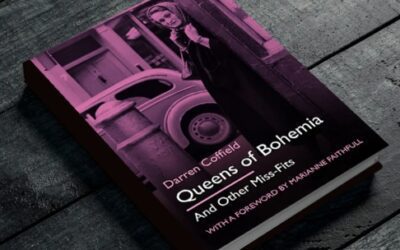[dropcap style=”font-size:100px; color:#992211;”]T[/dropcap]he Charlie Dutton Gallery in Holborn was founded, and is run, by Charlie Dutton. The clue is in the name.
Charlie Dutton (he of the Charlie Dutton Gallery) answers the Hanging Offence questions.
What first drew you to art?
Good education and having good teachers encouraging me to take art further.
[quote]communications between
gallerists, artists and
the viewers can
become misunderstood:
rudeness, anxieties and
insecurities are
a lethal cocktail[/quote]
Firstly I wanted to be a photographer of sorts, then fine art came to me in my foundation year in Stroud; it couldn’t get any better and I had a great time discovering and learning, but I had to get to the bright lights of the city!
Next was my degree, then postgraduate. I think I was there for the golden years at Central St.Martins when there were minimal money issues and fabulous tutors. Education is about being nurtured and encouraged.
This government does not seem to get it.
How did your gallery start?
I wanted to open a gallery for years having curated shows in alternative spaces. A beautiful space my friends live above became vacant and I asked if they would like to be sleeping partners in a gallery. They said ‘No, perhaps comatose ones instead!’ They and my partner Kate are 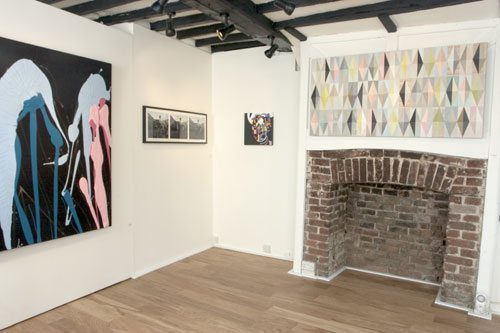 extremely patient and supportive. I drew together the network I had built up in the art world over the last 20 years to lend a hand.
extremely patient and supportive. I drew together the network I had built up in the art world over the last 20 years to lend a hand.
What is the vision for this gallery?
The gallery has a unique charm of its own, showing contemporary, cutting edge art from emerging artists in a Tudor building. I want to continue with its approachable and unpretentious atmosphere and keep it sustainable for the artists I wish to represent and show.
I would like to do the right sort of art fairs, however there isn’t anything in London at the moment yet. New York and Miami have it sorted.
Which artists typify the vision you have for your gallery?
Each of the artists are unique and exciting in their own way.
What do you dislike most about art?
Art relishes in magic and smoke & mirrors. This is important, fabulous and alluring, but some people in the industry don’t understand that. The communications between gallerists, artists and the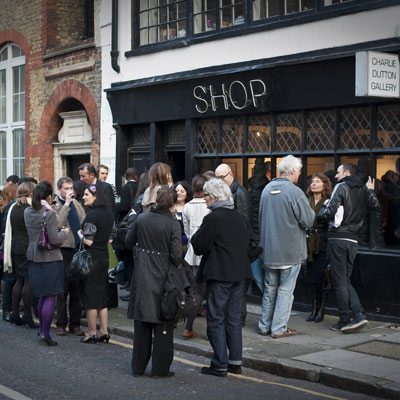 viewers can become misunderstood: rudeness, anxieties and insecurities are a lethal cocktail. When this perfect storm manifests in a stupid person’s character, and then I have the misfortune to meet them, I just want to say ‘fuck it’ and give it all up.
viewers can become misunderstood: rudeness, anxieties and insecurities are a lethal cocktail. When this perfect storm manifests in a stupid person’s character, and then I have the misfortune to meet them, I just want to say ‘fuck it’ and give it all up.
How would you define artistic controversy?
Art is supposed to show you something, yet what some now call artistic controversy is hideously tiresome and contrived, it’s a paradox (and controversial in itself for an artist or gallery to even try). Sooooo last century, girlfriend!!
Do you think that controversy in is a positive force in art or a conceptual red herring?
My favourite colour is red and my favourite fish is Herring.
What’s been your biggest challenge?
Paying the bills.
What’s been your biggest success?
Measuring success is obviously subjective, but each day brings something new, from someone tweeting or writing something complimentary. Seeing work go to good collections like the Saatchi is another highlight.
Who are you five favourite artists and which pieces of theirs do you admire?
Fontana – the pink egg shaped one.
Gordon Matte-Clark – the house split in half.
De Kooning – any
Cy Twomly – any
Who do you think is the artist to watch at the moment and why?
Howard Dyke. Such a force of energy and bombastic approach to imagery, much needed in what is such a safe PR world.
What does the future hold?
I’m opening up a new section to the gallery and online sales called Back Shop Edition specialising in works on paper, from alternative photographic and printmaking crafted process, to atypical collage and poster work. Very exciting.
CHARLIE DUTTON GALLERY
1a Princeton Street
London
WC1R 4AX
UK
0207 831 0889
[button link=”http://www.charlieduttongallery.com/” newwindow=”yes”] Charlie Dutton Gallery[/button]

The aim of art is to represent not the outward appearance of things, but their inward significance. – Aristotle

